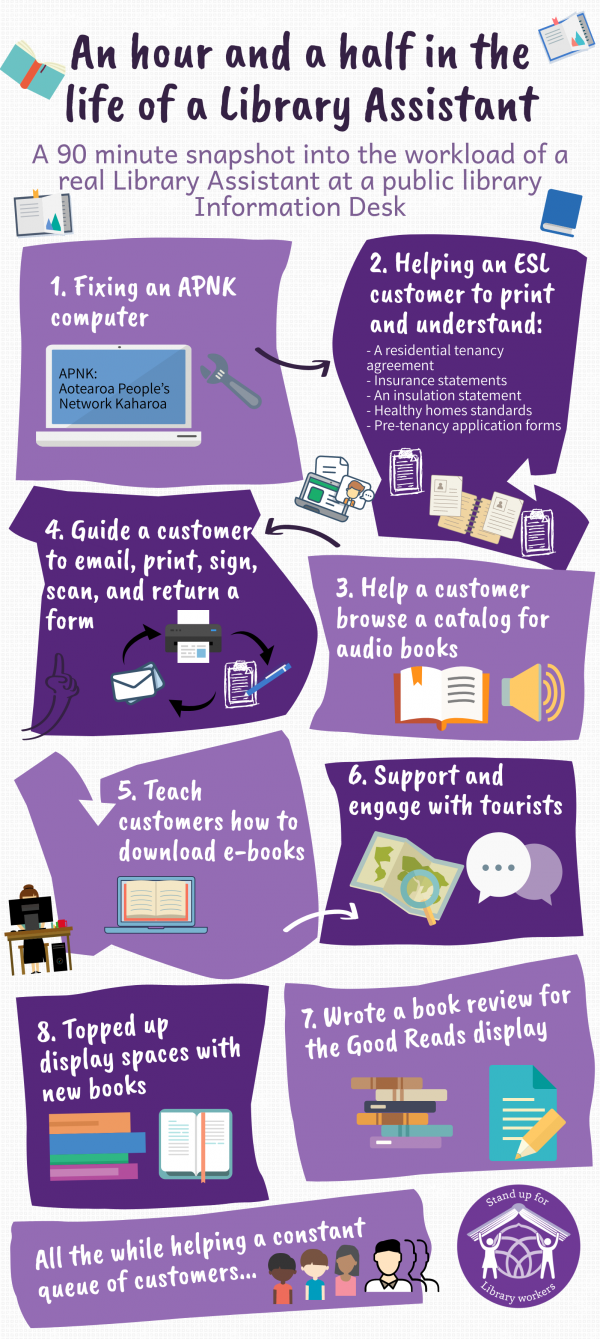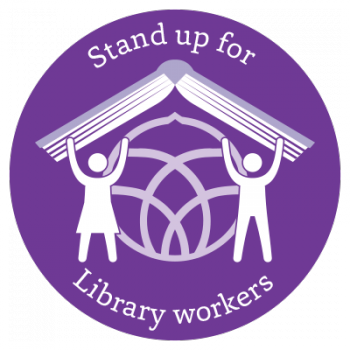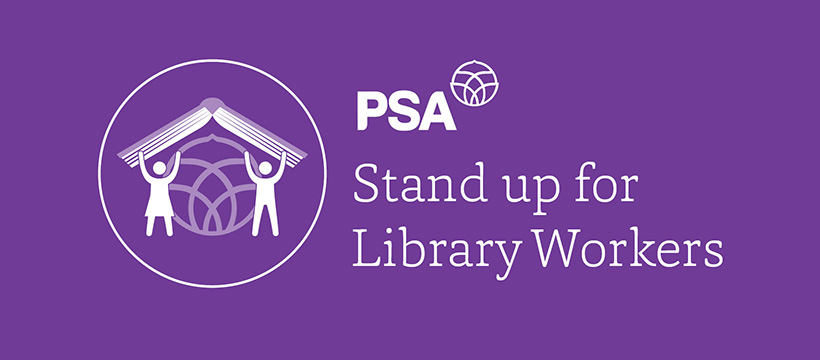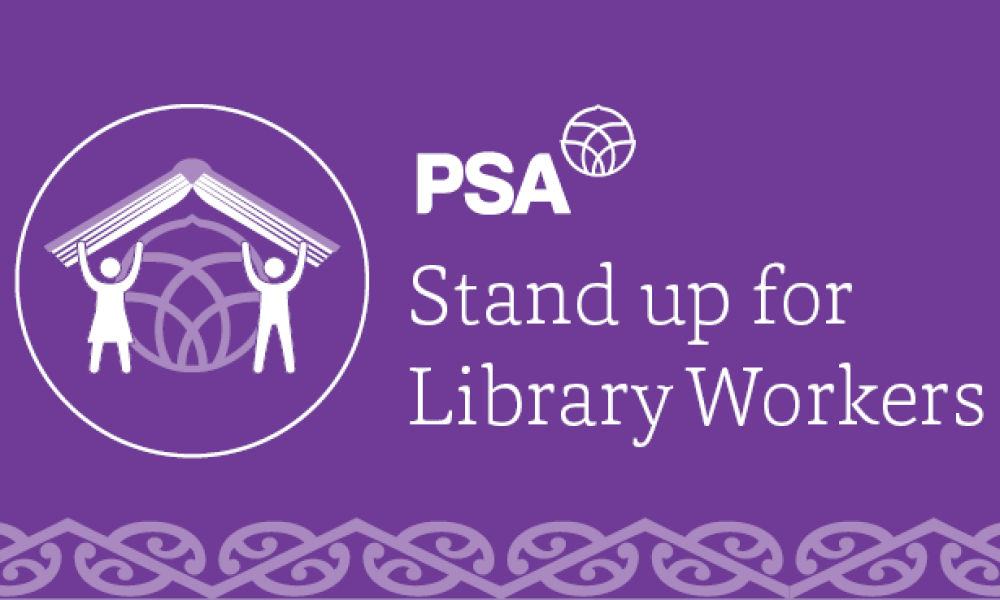Latest Update
Library Assistants Claim
We have finished interviewing members for the claim. This means we can now move onto creating the role profiles for your work. These profiles are similar to a job description, but instead of just recording the basic duties of your work, they summarise all of the elements that make up your value.
These profiles are used then used to create a score of the value of your work, which is then compared against male-dominated comparable roles to determine the level of undervaluation of your role. Because of this, it’s really important to make sure that the role profiles are as accurate as possible.
The role profiles are scored using a tool called Te Orowaru. Click here to find out more about this important Pay Equity tool.
Because of this, as we move into creating the role profiles, we will also be undertaking a quality review of the data we have already gathered. This will be done by a reference group - a group of library workers who scrutinise the role profiles and data to ensure that we are not missing anything out.
We will continue to provide updates to members as this develops.
Kind regards,
The PSA Library Workers Pay Equity team.
______________________________________________________________
Background
"We are seeking pay equity to right an historical injustice. Over 80% of library assistants are women. We perform complex roles, but there is little financial reward for doing so.” - Eleanor Hagerty-Drummond, Library Assistant, Wellington City Council, PSA delegate and Library panel member
In May 2019 the PSA notified the six large urban councils that we believe library assistants working in local government suffer from illegal gender-based pay discrimination, and that they have an arguable equal pay claim under the Equal Pay Act 1972
Note: While this claim only pertains to people doing the job of library assistants, the PSA believes that all local government workers who are working in female dominated occupations are likely to suffer from gender-based pay discrimination. This includes other library workers and administration and clerical workers. Our aim is to use equal pay settlements achieved in one occupation, or in another sector, to achieve equal pay across our membership.
Frequently Asked Questions
Pay Equity is about people in female dominated professions and people in male dominated professions receiving the same pay for doing jobs that are different, but of equal value. That is, jobs that require similar levels of skills, responsibility, and effort.
Historically, there is a lot of work that has been traditionally considered as “women’s work”, and has therefore been performed predominantly by women.
This often falls along the lines of “caring work” such as library workers or healthcare workers, or work that is considered “low skill”, like administration workers. A large number of people in these professions are employed across the Public Service.
Over time, the pay for this kind of work has steadily fallen behind work in other occupations that might be of similar value but has historically been performed by or associated with men (engineering, law enforcement, prisons).
Pay Equity is about establishing the extent of the undervaluation for those traditionally female dominated professions, negotiating a pay adjustment to remove undervaluation, and then maintaining pay rates over time to ensure that women never suffer from gender based pay inequities again.
This is one of the most important concepts in Pay Equity.
Value is about measuring work by all of the skills that go into it - not just the stated duties and qualifications. Different Pay Equity claims use different tools to measure the value of a role - but it includes things like:
- Knowledge (academic and non academic/lived experiences).
- Problem-solving (the kinds of problems someone faces in the workplace, what it takes to solve them, and what support they have in doing it)
- Interpersonal and communication skills (the skills required to communicate, establish and maintain relationships, the complexity of interactions, and the importance of outcomes).
- Te Ao Māori skills
- Planning and organisational skills (the nature and complexity of tasks, the level of uncertainty required, the level of autonomy and responsibility).
- Physical skills (physical or fine motor skills required on the job, and how hard they are to learn and perform).
- Responsibility for people leadership (both ‘direct’ leadership and leading through influence).
- Responsibility for information (gathering, processing, maintaining, developing information - as well as the sensitivity or significance of information managed).
- Responsibility for physical and financial resources.
- Responsibility for organisational outcomes.
- Responsibility for services to people (what services they provide to others, the importance or significance of these services).
- Emotional effort.
- Sensory effort.
- Physical effort (separate to physical skills - the physical intensity of the role and the impact of this on the person).
- Working conditions (the nature of the work environment - including pleasantness, hazards, and comfort).
Our Pay Equity process aims to identify and assess these factors (and more) to create a profile of different types of work. We then compare these profiles to profiles of comparable positions in male dominated areas. This allows us to establish the undervaluation of the work, which we then seek to address through negotiations.
Because many of these elements have historically not been measured for many female dominated occupations, this process could have a significant impact on pay for thousands of Public Service workers.
We use a tool called Te Orowaru to assess your work.
Click here to read more about Te Orowaru.
Pay Equity Resources
To download images for use: Right click and select "save image as".




For more information:
View the presentation by PSA delegate Suzie Moore to the LIANZA conference on the Pay Equity claim for library assistants, presented on 11 November 2021.








































